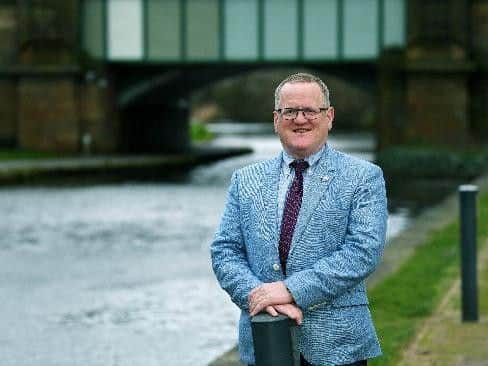'New Government NHS funding is tip of the iceberg to close North-South divide'
The NHS Funding Bill was introduced to the Commons yesterday, marking the first step of enshrining in law an extra £33.9bn a year by 2024 for the health service.
But while Government ministers dubbed the sums the “largest ever cash increase” for the NHS, Dr Séamus O’Neill, Chief Executive of the Northern Health Science Alliance (NHSA) said it was just the tip of the iceberg.
Advertisement
Hide AdAdvertisement
Hide AdDr O’Neill said: “While the NHSA welcomes the commitment from the Government to increase NHS funding and enshrine this into law, the extra funding will only be just enough to match current patient demand.”


The NHSA’s Health for Wealth report found that improving health would reduce the £4 gap in productivity per-person per-hour between the North and the rest of England by 30 per cent, or £1.20 per-person per-hour, generating an additional £13.2bn.
Dr O’Neill said: “In order to level up the North and address the persistent health inequalities that exist between the North and the rest of the UK, the Government should restore the public health funding grants to address the real term loss of funding since 2010 from the public health budget.
“That £1bn may be a big ask but it is an investment in the future of the Northern Powerhouse.
Advertisement
Hide AdAdvertisement
Hide Ad“There is also an opportunity to invest in the NHS’s capacity to bring health innovation investment and opportunities to the North, building on the strengths and expertise in a hugely innovative sector for the region.”
Prime Minister Boris Johnson admitted in the Commons yesterday that NHS were "unacceptable", in the face of demands from Jeremy Corbyn for action to help patients.
But Health and Social Care Secretary Matt Hancock said: “During the election campaign, we committed to boosting funding for our NHS over the course of the Parliament and ensuring these new resources get to the frontline so that patients receive the care they need.
“Today we are making good on that manifesto commitment by introducing the NHS Funding Bill, demonstrating this government’s ironclad commitment to the NHS.
Advertisement
Hide AdAdvertisement
Hide Ad“With this unprecedented bill, we will enshrine in law the largest cash settlement in NHS history – bringing the total annual budget to almost £150bn within 5 years.
“This funding bill will empower the NHS and its world-class clinicians to deliver our bold plan for the NHS. They can do so safe in the knowledge this government is giving them the financial certainty and support to revolutionise prevention, detection, and treatment of thousands of patients over the coming decade.”
He also hinted the four-hour A&E waiting time target could be scrapped, after the NHS in England recorded its worst figure on record.
He said that performance must be "judged by the right targets" after official data showed only 79.8 per cent of emergency patients were seen within four hours in December.
Advertisement
Hide AdAdvertisement
Hide AdThis was the worst performance ever against the target that 95 per cent of A&E patients should be seen and treated, discharged or admitted to hospital within that timescale.
Labour's Shadow Health Secretary, Jonathan Ashworth, said: "Changing the A&E target won't magic away the problems in our overcrowded hospitals, with patients left on trolleys in corridors for hours and hours.
"Any review of targets must be transparent and based on watertight clinical evidence, otherwise patients will think Matt Hancock is trying to move the goalposts to avoid scrutiny of the Government's record.”